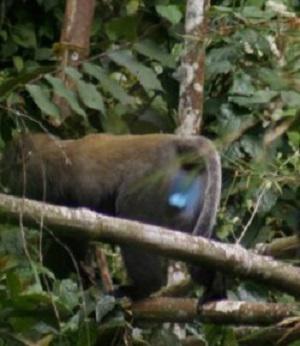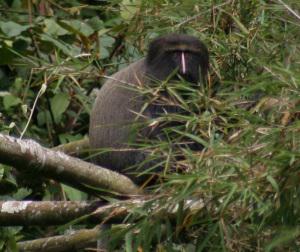A video featuring the project.
Wycliffe Tumwesigye
The aim is to map the change in bamboo habit (1986-2013), and environmental education to protect the Cercopithecus hamlyni and other species across Nyungwe-Kibira ecosystem.

Male Cercopithecus hamlyni. © Ntare Nicholas, WCS.
Illegal bamboo harvesting is a major threat to biodiversity across the Nyungwe-Kibira trans-boundary ecosystem. Bamboo trees are used by local people for building, fencing, making handcrafts, and roasting meat for sale. The aim of this project is to reduce the loss of bamboo trees that act as a habitat for important species such as: Cercopithecus hamlyni, Apalis argentea and Phodilus prigoginei, which are endemic in the Albertine Rift region. ArcGIS 10 software and remote sensing land use change techniques will be used to map the change in bamboo ecosystems from 1986 to 2013. Trans-boundary engagement of all stakeholders including local leaders and environmental education to the community and secondary school students will form an integral part of this project. A map of the change in bamboo ecosystems in Rwanda and Burundi, and an environmental education strategy will be the key outputs from this project. Best10 bamboo cooperatives will be rewarded to boost their moral to expand and grow more bamboo trees on the marginal land. This will reduce the pressure on bamboo trees from the protected areas hence promoting the protection of owl-faced monkeys (Cercopithecus hamlyni) and endemic birds (Apalis argentea and Phodilus prigoginei) in the region.

Female Cercopithecus hamlyni. © Ntare Nicholas, WCS.
Kitabi College of conservation and Environmental Management (KCCEM) students and staff will lead in mapping exercise and designing environmental education strategy while some of the staff members from Nyungwe and Kibira National parks will participate in conducting household surveys in selected sectors adjacent to the study area. Data from household surveys will give more insight on the change of bamboo habitat for the last 27 years. KCCEM students will participate in the mapping as part of their field studies to enhance their GIS practical exercises. Three workshops for the selected stakeholders:- an inception workshop, mid-term workshop and end of project workshop will be conducted with selected stakeholders to establish their attitudes and perceptions on protection of the mentioned species and suggest ways in which the loss of bamboo ecosystem can be minimized hence protecting the endemic species that live in this habitat.(link to KCCEM website: http://www.kccem.ac.rw/spip.php?article9)